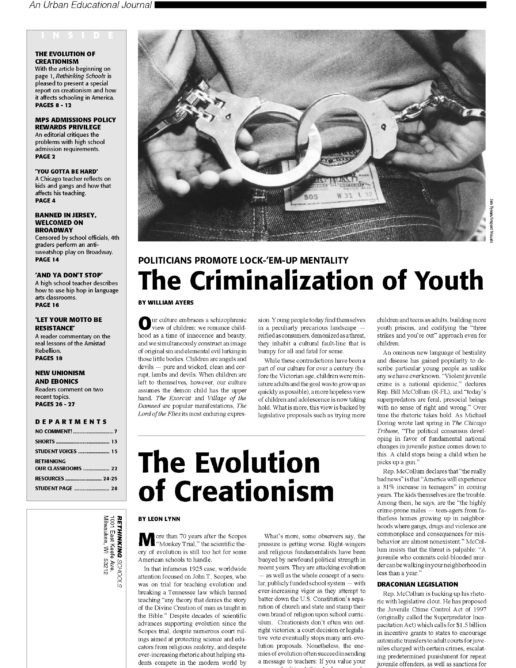Preview of Article:
The Evolution Of Creationism
Right-Wing Zealots Attack Science
Simply put, evolution is the scientific theory that all life forms on earth today are descended from a single cell, or at most a very few different cells. The diversity we see among species is the result of biological changes that have taken place over many hundreds of millions of years. During that time, new variations of plants and animals have appeared, through what the National Association of Biology Teachers terms “an unsupervised, impersonal, unpredictable, and natural process of temporal descent … .” Those new variations best able to adapt — to find food, escape predators, protect living space, or produce offspring — survived to pass along their traits to future generations. This is the process that Charles Darwin termed “natural selection” in his seminal 1859 work, “On the Origin of Species by Means of Natural Selection.”
The scientific community attaches great importance to the theory of evolution. The National Association of Biology Teachers says it’s impossible to provide “a rational, coherent and scientific account” of the history and diversity of organisms on earth, or to effectively teach cellular and molecular biology, without including the principles and mechanisms of evolution. Similarly, leading national voices for the reform of science education, including the National Science Teachers Association and the American Association for the Advancement of Science, emphasize the importance of teaching evolution as part of a well-rounded K-12 science curriculum. An NSTA position paper on evolution, for example, notes that there is “abundant and consistent evidence from astronomy, physics, biochemistry, geochronology, geology, biology, anthropology, and other sciences that evolution has taken place,” making it an important “unifying concept for science.” Scientific disciplines “with a historical component, such as astronomy, geology, biology, and anthropology, cannot be taught with integrity if evolution is not emphasized,” NSTA concludes.
What Creationists Believe
Generally, there’s no conflict today between the theory of evolution and the religious beliefs of people who think that a supernatural entity guided the creation of the world. Many scientists and philosophers who accept the validity of evolution are nevertheless devoutly religious. Even Pope John Paul II, in a statement released in 1996, said that while the Catholic church holds that God created heaven and Earth, there is strong scientific evidence to support evolution.
In the realm of U.S. politics and education, however, the term “creationist” is generally used to refer to people actively pushing a particular, fundamentalist Christian religious perspective which rejects the theory of evolution as false. While there are different factions — some creationists insist that Earth is only a few thousand years old, for example, while others remain open to the possibility that it’s much older — people actively challenging evolution and seeking to promote creationism generally believe that:

